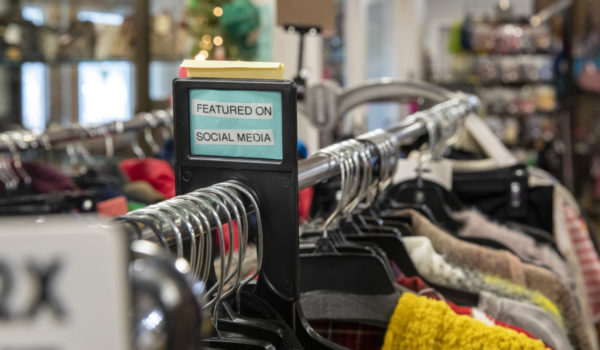
Consignment and resale stores aren’t just for the frugal
By Rebecca Berfanger
Whether your handbag no longer sparks joy, you’ve been on the hunt for that one perfect blazer for virtual meetings, you want to try a new look, you’ve been cleaning out your closets — or soon plan to — and want to make a little ca-ching, or want to just support the local economy, local resale stores might be just what you’re looking for.
And you would be far from alone.
The typical resale shopper has changed over the years, says Vena Holden, owner of Selective Seconds Consignment.
“(The typical resale shopper) used to be somebody that had to shop to save money,” Holden says. “And now it’s somebody that loves to save money, loves to recycle and is passionate about recycling and saving the Earth, and somebody that appreciates quality for 50 to 80% off retail.”
According to the Association of Resale Professionals, recent studies have shown that while the annual revenues for resale in the U.S. vary, it’s anywhere from $17.5 billion, according to First Research to $24 billion in 2018, with the expectation of $64 billion in sales by 2028, according to online resale website, ThredUP. According to a report from NARTS: The Association of Resale Professionals, Goodwill Industries alone generated $5.9 billion in retail sales from more than 3,000 nonprofit resale stores and online sales in 2017.
Resale shopping is a trend with growth potential. “It’s grown substantially in the last five to 10 years,” Holden says. “It’s just going to continue to grow. Also, resale, I believe, is a recession-proof business. When the economy gets bad, people want to save money, and people are also looking at ways to creatively make money, and it’s an easy way to make money. There’s no money out of your pocket; just clean out your closet.”
Social media effect
Whether you call it thrifting, resale or consignment shopping, shopping for new-to-you garments has become popular thanks in part to Instagram, Facebook and Pinterest, where people are often sharing — dare we say bragging? — about their fantastic finds by posing in and with their thrifted treasures. Hashtags like #thriftstorefinds, and #thrifting, respectively, have 6.3 million and 7.5 million posts on Instagram of beaming buyers.
Local consignment stores are also virtually updating their customers who can’t come visit their stores. At least three Greenwood stores — Selective Seconds Consignment, Abby’s Closet, and Style Encore’s Greenwood location — have been regularly posting their recently acquired items and hosting online shows on their websites and social media platforms.
Marnie McKnight, owner of Greenwood’s Style Encore, says a lot of that store’s shoppers prefer to shop online. And while she doesn’t encourage them to shop while at work, maybe while on a break, they will place an order to pick up later.
Holden and Abby Jackson, owner of Abby’s Closet, both in Greenwood, also have experienced success with their social media shows. Both women encourage those who are new to thrifting to start by watching a virtual sale to get a sense of the types of items stores carry, not to mention shop in real time.
Another hashtag, #goodwillfinds, is also having a moment, garnering some 644,000 tagged posts on Instagram. Kent Kramer, Goodwill of Central & Southern Indiana president and CEO, says they’re aware of this trend.
“People are having fun with it, creating their own outfits,” Kramer says. “The outlets are great for that. People will go in and buy one thing and repurpose it, and they can make something new out of somebody else’s discard. We think it’s pretty cool when people buy a pair of jeans and make a purse out of it or buy a bunch of board games and piece them together for full board games.”
Think globally, act locally
Although consignment and resale stores used to be seen as just a way to save some money or where to take leftover items that remained after an estate sale or yard sale, attitudes have shifted dramatically in the last few years, say the store owners.
For one, there are environmental benefits of donating, selling or consigning those gently used items. Kramer says clothing and other textile items that are donated but they can’t sell even at a deep discount are recycled. Goodwill works with a five-week cycle.
“If it doesn’t sell within five weeks, we’ll pull it off the floor, and it goes down to 99 cents, down to a low number,” Kramer says. “If it still doesn’t sell, we’ll pull it, and it goes to that outlet process, where it’s sold by the pound. If it doesn’t sell there, we’ll send to our recycling operation. We’ve got buyers who buy things for rags or buy for reuse or a lot of different options. Our goal is to keep 100% of our textiles out of the waste stream. That process allows us to do that.”
Jackson has also noticed a generational shift in attitudes.
“I have three children in college and one in middle school,” she says. “They want to go thrift shopping; they [do it to] save the Earth. I’ve had several customers say they won’t shop anywhere but consignment.”
Jackson adds that it was her children who encouraged her to open her store in 2019, and they did so because of the environmental impact.
And second, in the case of Goodwill, donations help support the community.
“Goodwill donations provide employment opportunities, sometimes long term and sometimes transitional or to get job training,” Kramer says. “When people donate to Goodwill, they also provide opportunities for adults to get their high school diplomas at the Excel Center.”
Proceeds from Goodwill donations fund programs to promote healthier communities, Kramer says, including the Nurse-Family Partnership, where first-time, low-income moms are paired with a registered nurse who works with and connects the new moms to resources.
Other resellers also support charities. Style Encore and Abby’s Closet donate unsold items to local shelters. Selective Seconds has specifically been focused on accepting donations of items where the proceeds would go to Upstream Prevention Inc., which promotes public health initiatives, including mental health programs in Johnson County. Holden added she will open consignment accounts for just about any fundraiser.
Whether you’re resale curious, you’ve been planning to clean out your closets, you want to try a new trend without paying full price or all of the above, there’s never been a better time to check them out.
“All resale shops are different. You should try several and shop often, because inventory changes drastically from week to week,” Holden says. “You’ll be surprised at the quality and how much you’ll save. Once you do it a few times successfully, you’re hooked.”
Plan ahead
There’s a strategy to all shopping, and resale shopping is no different. If you’re looking for the perfect party dress or some office-appropriate athleisure wear, new items go on the sales floors daily, so there might be a need to make multiple trips, at least virtually, to various stores. Holden says they typically receive more items in the spring and fall when their sellers tend to be rotating out their seasonal wardrobes.
However, keep in mind that each store has its own policies when it comes to seasonal clothing. Style Encore will accept clothes year-round, regardless of the season, but will only keep those items on the floor for a couple of months. On the other hand, Abby’s Closet will only sell items that are seasonal, with a catch.
“Other places will do 60 days or 90 days, but I’ll leave stuff for the season. In Indiana, a season can be eight months, so I base it on the weather,” Jackson said of Abby’s Closet. As of mid-October, she said, “Most of my shop is fall and winter, but I still have a couple racks that have summer things for people traveling to Florida.”
Try new things
One benefit of shopping resale is being able to try a new style you maybe wouldn’t have thought of taking a risk on at full price.
To make this less daunting, some resale stores offer personal shopper services. A store associate can put outfits together based on the customer’s size, preferred style, type of clothing, season and other factors. These services can take place online for customers to pick up later or in store.
Abby’s Closet has been hosting parties in its off hours with the option of a personal shopper at an affordable price. She’s seen bachelorettes and birthday girls and their guests enjoy trying new-to-them styles and ensembles.
Cash rules
And don’t forget consignment and resale are still an easy way to make some cash.
As a resale store, Style Encore pays cash up front. McKnight says they are looking for the condition of the items more than the brand but will pay more for higher-end items and handbags.
“We are choosing what we want to purchase and paying on the spot,” McKnight says. “Usually within a half hour to an hour. Our goal is to make it easy and convenient to the customer.”
For consigning through Abby’s Closet or Selective Seconds, both store owners suggest sellers consider making an appointment ahead of time or expect a little bit of a wait for their items to be priced and, in cases of high-end brands, authenticated. Once an item is accepted and appraised, it will be placed on the sales floor, and the store will share the proceeds with the consignors. Abby’s Closet gives 50% to its consignors; Selective Seconds has a similar model, depending on the brand and the item.
“We’re true partners. I love writing checks and signing checks. If I make a consignor happy, they will bring me more things,” Holden says.


